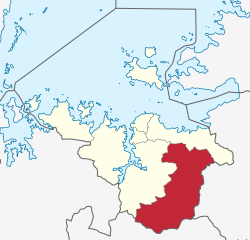Kwimba District is one of the seven districts of the Mwanza Region of Tanzania. It is bordered to the north by the Magu District, to the east by Maswa District and Kishapu District, to the south by Shinyanga Rural District, and to the west by Misungwi District. The district seat is at Ngudu. Sumve is another important settlement in Kwimba District, hosting a hospital and large church.
Kwimba District
Wilaya ya Kwimba (Swahili) | |
|---|---|
 Kwimba District of Mwanza Region | |
| Coordinates: 02°58′S 033°20′E / 2.967°S 33.333°E | |
| Country | |
| Region | Mwanza Region |
| Area | |
| • Total | 3,254 km2 (1,256 sq mi) |
| Population (2022) | |
| • Total | 480,025 |
| • Density | 150/km2 (380/sq mi) |
The majority of the residents of Kwimba are Wasukuma from the Sukuma tribe and speak Sukuma along with Swahili. Most of the residents are engaged in the subsistence farming of rice, sweet potatoes, cassava, millet or maize.
As of 2012, the population of the Kwimba District was 406,509.[1] By 2022, the population had increased to 480,025.[2]
Livestock
editThe 2002 Tanzania National Census showed the following statistics for livestock population in the Kwimba district:
- Cattle - 366,210
- Goats - 102,048
- Sheep - 77,333
- Donkeys - 4,416
Transport
editPaved trunk road T8 from Shinyanga to Mwanza passes through Kwimba district from south to north.[3]
The Central Line railway from Tabora to Mwanza passes through the district from east to west and there are three railway stations within the district's boundaries at the villages of Malya, Bukwimba and Mantare.[4]
Administrative subdivisions
editAs of 2012, Kwimba District was divided into five divisions and 30 wards.[1]
Divisions
edit- Ibindo
- Ngudu
- Ngulla
- Nyamilama
- Mwamashimba
Wards
editReferences
edit- ^ a b "Census 2012". National Bureau of Statistics. Archived from the original on 5 March 2016. Retrieved 9 December 2015.
- ^ "Tanzania: Administrative Division (Regions and Districts) - Population Statistics, Charts and Map". www.citypopulation.de. Retrieved 2024-02-11.
- ^ "Mwanza Roads Network" (PDF). Tanroads. Archived from the original (PDF) on 4 March 2016. Retrieved 9 December 2015.
- ^ "Railways Network". Tanzania Railways Limited. Archived from the original on 6 October 2016. Retrieved 7 March 2016.